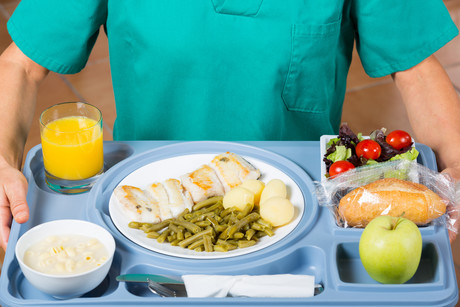Malnutrition widespread in US hospitals

About one in three hospitalised adults in the US are at risk of malnutrition, and many are eating inadequate amounts of food, which is which is increasing their mortality risk.
A study from nutritionDay, in collaboration with Abbott, analysed the prevalence of hospital malnutrition and the impact of food intake by looking at data from nearly 10,000 patients from 245 US hospitals. They found 51% of patients are eating half or less of their meals, and adults who ate none of their food had a death risk that was nearly six times higher than those who ate some food.
''Malnutrition can be invisible to the eye and is rampant in US hospitals because it's not always top of mind — symptoms, like decreased energy and unintentional weight loss, can often be attributed to a patient's primary diagnosis,'' said nutritionDay President and Founder Gail Gewirtz. ''However, our data shows that one warning sign — poor food intake — is very common in hospitals, and this is something healthcare providers can easily look out for and address.''
Malnutrition, which effects both underweight and overweight individuals, occurs when the body doesn't get the nutrients it needs. Often patients arrive at the hospital either malnourished or at risk, and poor food intake while hospitalised can cause further complications and delay recovery.
The research revealed nearly half of infectious disease and long-term care patients and more than 40% of oncology patients were at risk of malnutrition. Only 11% of patients who were allowed to eat but ate nothing received a nutrition supplement, which could significantly influence their recovery, explained Abby Sauer, a registered dietitian at Abbott and lead study author.
''Patients don't always have the best appetite or desire to eat while in the hospital, so it's important to create an environment and serve up options that promote optimal food intake,'' she said. ''Numerous studies confirm that nutrition care, including a supplemental nutrition drink, can help malnourished patients and those at risk get the nutrients and energy they need to avoid complications, recover and get out of the hospital faster.''
As well as providing nutrition drinks to patients who are malnourished, the research suggested a number of steps healthcare providers, caregivers and patients should take to reduce malnutrition. These included: offering assistance to patients with limited mobility or other impairments, such as opening packages; confirming the healthcare facility has alternative food or nutrition options during off-hours or if the patient is away during meal times; and recommending a consultation with a registered dietitian nutritionist for patients with limited appetites, specific nutrition needs or risk factors.
The study is published in The Journal of Parenteral and Enteral Nutrition.
Four food safety tips for the silly season
With food poisoning typically rising over the summer months, New Zealand Food Safety has provided...
Saputo Dairy Australia launches Individually Quick Frozen shredded mozzarella
SDA has developed the product for food service outlets using the IQF process that...
Aust foodservice professionals honoured at national awards
Foodservice professionals from across the country gathered in Sydney to celebrate the winners of...








